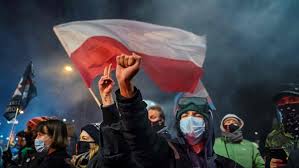Abortion ban law in poland invited protests
The near-total abortion ban law implemented in Poland which instigated new rounds of protests around the nation three months after the top court termed the abortion of congenitally damaged fetuses as unconstitutional. The streets of Warsaw are flooded with crowds of people protesting against the new law. The protests are majorly led by Women's rights groups and activists who took over the town streets upholding and raising their demands of retraction of this law on Thursday for the second evening in a row.
A banner read, "You killed the desire in me to have more children," which was held by a woman among protestors at Warsaw. They strongly feel that this denial for termination of pregnancies in an event of undeveloped or deformed fetuses, will bar them from having more children. Poland's top human rights official asserted that such restraining and conservative laws are inviting miseries for women and are a tragedy for them. "Such laws aim to restrict their lives, ground their rights and leave them to suffer and torment. This is not acceptable by civil society," Adam Bodnar, the human rights commissioner independent of the government claimed.
Currently, under Polish law only legal justifications for abortions are if health or life of women is at risk or the pregnancy is result of rape or incest. Data suggests that 98% of abortions in 2019 were on grounds of fetal deformations. The announcement of ban on abortion came amid protests against erosion of civil rights and liberties in Poland and Hungary under right wing populist party. The indignities of democratic rights are spreading in other parts of central Europe, ambushing a challenge for European Union and US President Joe Biden who focuses to instate democratic norms in the country and abroad.
On Wednesday, Poland Constitutional Court issued a justification that tends to ban abortions of fetuses with congenital defects even in the cases with negligible survival after birth. The government then published the same ruling in the government Journal of laws. This was formal proceeding for new law to get published. The restriction is supported by Poland's ruling law and justice party which is aligned with Roman Catholic Church. They stayed firm on their demand as this will prevent abortion of fetuses with Down Syndrome. Women rights activists consider this law draconian. Protestors are demanding resignation of government and retraction of law.
Meanwhile, Women rights groups are adopting techniques to help women. The Federation for Women and Family planning aims to seek redressal in international courts, affirming that these laws exploit human rights. It is helping women to obtain abortion pills or travel abroad for further process. Protestors with green handkerchiefs on face as a symbol of abortion rights movement took to streets in Argentina. The South American country legalised abortion which is a revolution in deeply catholic country. Amnesty International explained law as, "terrible day for women and girls," after it took effect. In the 200 page ruling, the court justified the ban on abortions as an act to protect human life.





The Brief. Sign up to receive the top stories you need to know right now.